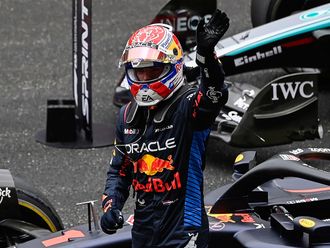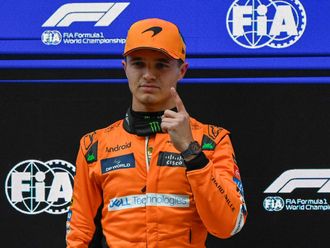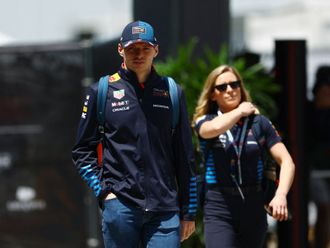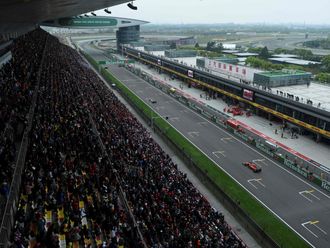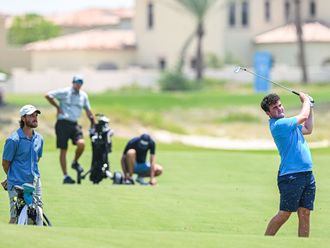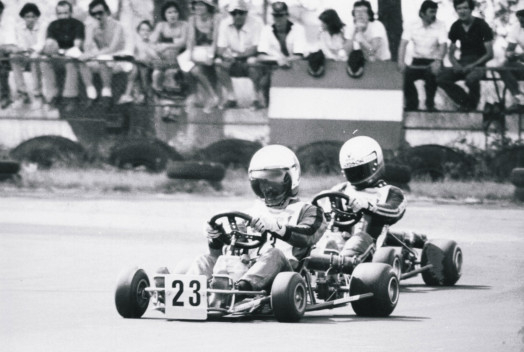
Dubai: Lewis Hamilton and Nico Rosberg’s rivalry is nothing on Ayrton Senna and Alain Prost’s relationship despite recent comparisons, according to Terry Fullerton, the driver who Senna once said he most enjoyed racing against.
Hamilton famously threw a second place cap at Mercedes teammate Rosberg last season after confirming his third Formula One drivers’ championship at the US Grand Prix in October.
But British former karting world champion, Fullerton, 63 – who was Senna’s teammate in karts during the late 1970s - said the cap spat had nothing on Senna and Prost, who would regularly run each other off the track in the late 1980s and early 1990s.
“The rivalry with Prost and Senna was a lot more heated, verbal and aggressive than anything that has ever happened between Hamilton and Rosberg,” said Fullerton, a man who knows only too well what it was like to get on the wrong side of Senna, having been pushed in a hotel swimming pool fully clothed by the Brazilian during their karting days.
“It’s not as raw or visceral, things seem a lot more superficial with the problems between teammates nowadays.”
Three time F1 world champion, Senna, who was killed in a crash at the San Marino Grand Prix in 1994 aged 34, famously overlooked Prost and said Fullerton, who didn’t make the leap from karting to F1 due to safety fears, was the driver he most enjoyed duelling with. But that doesn’t mean they were friends either.
“We didn’t get particularly close because he didn’t want to let our friendship blossom, he could have done but that was his personality and his way of dealing with it. He had to make you an enemy in order to compete against you, he couldn’t keep you as a friend or even view you as a reasonable acquaintance.
“I wasn’t like that, I’d keep a good relationship with my teammate even if he was beating me, but in the back of my mind I’d be thinking: ‘I’m going to have you, I’m going to learn everything I can off you and you will be second very soon’. I wouldn’t fall out with them, at least on the surface I’d still be friendly, but he dealt with it in a way that was a lot more honest I guess.”
Of being pushed in the pool by Senna after the Brazilian wrongfully accused him of a dirty overtake, Fullerton said: “I didn’t have any bad feeling towards him, he had bad feeling towards me, so whenever he showed that towards me it was always a bit of a shock because I didn’t understand why.
“I was beating him and going quicker than him, but that wouldn’t have made me show bad feeling towards a driver doing that to me, I would respect him and work out a way to beat him. I didn’t know what his problem was, but I was like: ‘get with the programme and do something to beat me, don’t push me in a pool’. That was my attitude but he was different to me and he was different to a lot of people I guess.
“I liked him, he was a nice kid, I just thought the way he dealt with that side of his racing and the way he dealt with his adversaries was too emotional and from my point of view that wasn’t the best way of handling it – but that’s the way he was, a victim of his own personality.
“His fans won’t want to hear it but he was intense to the point of reckless at times, certainly when he was younger, I saw him doing some crazy things but it was all because he was driven to succeed.”
Asked if he thought Senna had grown out of that by the time he moved into F1 in 1984, Fullerton replied: “I don’t think so, certainly not if you look at how he ran Prost off the track in Japan at the first corner in 1990 to win the championship, the year after Prost had done the same thing to him at the same circuit to deny him the title.
“But isn’t that what marks you out as a great? If you’re safe and steady, you’re not going to mark yourself out as one of the best ever.
“There was also that time he had an agreement not to overtake Prost on the first turn at San Marino in 1989 but he did so on the restart and then denied it despite the fact that millions of people had just seen him do it.
“That’s the way he was, if it suited his purpose and he was emotional about it, something everybody else could see was black, he would see in white.”
Fullerton didn’t move up the formulas from karting with Senna because his older brother Alec had been killed in a motorcycling race at Mallory Park in 1965 and his family would have been against it.
“At the time when I could have progressed, from the late 1960s to the early 1970s, there were about five or six F1 drivers dying per year - it was the most dangerous sport in the world, it was an unbelievably dangerous and stupid sport and I had no idea why people were doing it.
“If you look at the statistics you had a one in three chance of dying and they are not great odds. So, it was a lethal sport but after the 1970s it did start to get safer and Senna [along with Roland Ratzenberger who died on the same race weekend as Senna in 1994] was the first to die in a long time.”
Having retired as a racing driver in 1984, Fullerton ran his own race team nd then coached up-and-coming racing drivers including: Indycar driver Justin Wilson, Force India driver Paul Di Resta, double Indianapolis 500 winner Dan Wheldon, double 24 Hours of Le Mans winner Allan McNish - and former F1 driver Anthony Davidson.
Fullerton is still active as a manager and driver coach in karting.
Of Senna’s death though, Fullerton said: “I had followed his career in cars and often thought of what might have been if I had raced in cars but it was all pipe dream stuff because it was never going to happen.
“So it came as a serious blow, because when you share that kind of thing, when you are teammates with someone, you stay in the same hotels and eat in the same restaurants, whichever way you look at it you end up being close and I had a lot of respect for him and I’m pretty sure he had a lot of respect for me, so without a doubt it was an emotional blow when he died not just for me but also my family who were all fans of his.”
Senna and Fullerton never did bury the hatchet, but the grainy footage after the last win of his career at the Australian Grand Prix in November 1993, where Senna said he most enjoyed driving against Fullerton over Prost because of the lack of politics and purity of racing in karts, has come as an olive branch from beyond the grave to the Englishman after it was used as the closing chapter of the 2010 documentary ‘Senna’ by Asif Kapadia.
It perhaps shows how disillusioned the Brazilian had become with F1 in the months leading up to his death - or was Senna taking one last chance to divert the attention away from Prost, who was retiring as a four-time world champion after that race in Adelaide? Either way, it jettisoned a relatively unheard of Fullerton out of obscurity.
“You have to guess at that but he was asked a question and he answered it, but he answered it in light of all the experiences of his recent past and maybe he didn’t feel like mentioning anyone in F1.
“He remembered his karting days as the greatest time in his life and I think they were genuinely his happiest memories and he chose to mention me from that era and that means a lot.”


